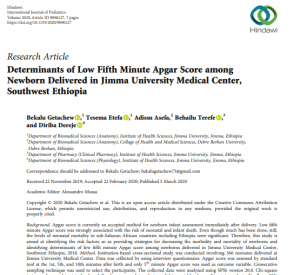
Apgar score is currently an accepted method for newborn infant assessment immediately after delivery. Low fifth minute Apgar score was strongly associated with the risk of neonatal and infant death. Even though much has been done, still, the levels of neonatal mortality in sub-Saharan African countries including Ethiopia were significant. Therefore, this study is aimed at identifying the risk factors so as providing strategies for decreasing the morbidity and mortality of newborns and identifying determinants of low fifth minute Apgar score among newborns delivered in Jimma University Medical Center, Southwest Ethiopia, 2018.
Method
Institution-based cross-sectional study was conducted involving 366 neonates delivered at Jimma University Medical Center. Data was collected by using interview questionnaire. Apgar score was assessed by standard tool at the 1st, 5th, and 10th minutes after birth and only 5th minute Apgar score was used as outcome variable. Consecutive sampling technique was used to select the participants. The collected data were analyzed using SPSS version 20.0. Chi-square test was done at bivariate level and value was used to select candidate variables for multivariate analysis. Finally, a 95% confidence interval was used to assess significance.
Results
A response rate of this study was 95%. The proportion of low 5th minute Apgar score in this study was 11.5%. Prolonged duration of labor (, 95% CI: 5.51-40.27), maternal history of khat use (, 95% CI: 1.26-8.85), and low birth weight (, 95% CI: 1.02-3.11) were predictors of low fifth minute Apgar score.
Conclusion
About one tenth of newborns were having low 5th minute Apgar score. The likelihood of low 5th minute Apgar score was found to increase with prolonged duration of labor, history of mother’s khat use, and low birth weight.